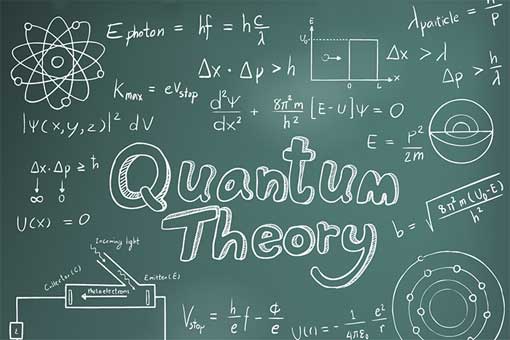Quantum Mechanics and Consciousness
The Copenhagen Interpretation
The most popular explanation of quantum mechanics is known as the “Copenhagen interpretation”. It was conceived in Copenhagen by Niels Bohr and Werner Heisenberg in the 1920s. It says that quantum particles don’t exist in one particular state, but in all possible states at once, and it is only upon observation or measurement that one particular state crystalises out, and that is the state that we observe.
So according to the Copenhagen interpretation, quantum mechanics only provides knowledge of phenomena, not knowledge of objectively existing objects. It suggests that reality only becomes physically “real” when it is observed, so reality may not be objective and deterministic, but may actually be subjective and influenced by our consciousness.

The Many-Worlds Interpretation
Some physicists don’t like the Copenhagen interpretation because it doesn’t explain what determines which of the many possibilities becomes the actual observed reality. Also, they don’t want to accept that consciousness can interact with reality because that would take them beyond conventional physics and into the realm of metaphysics. So they promote an alternative interpretation of quantum mechanics called the many-worlds interpretation (MWI). It says that instead one possible reality crystalising out into actuality, they all do, i.e. the universe effectively splits in two and a new universe is created for every quantum possibility.

So because their deterministic view can’t explain why one particular version of reality manifests over all the others, they believe that every possible version of reality manifests. This means that trillions of almost identical new universes are instantly created every nanosecond, and each of these gives rise to trillions more, and so on, and so on. It sounds implausible, impractical and flies in the face of common sense, but apparently “the math works”, and that is enough for some physicists to buy into it. But the many-worlds interpretation actually raises more questions than it answers…
Many Worlds = Many Issues
The unanswered question from the Copenhagen interpretation (why does this one particular reality manifest instead of the others?) is simply replaced by an almost identical unanswered question from the many-worlds interpretation (why is this one particular reality experienced instead of the others?). But these two deterministic questions are essentially one and the same, because the reality that manifests is the reality that we experience, so we are right back to square one.
So the many-worlds interpretation doesn’t solve anything. In fact, it raises more questions than it answers; such as where are all the other universes and how do they form? It also fails “Occam’s razor”, which states that the simplest explanation is usually correct.
The only good thing about the many-worlds interpretation is that it casts significant doubt on the deterministic view of reality. Determinism can’t answer either variant of the question “what determines which version of reality is manifested/experienced”, so perhaps the deterministic view itself is the issue? Perhaps the universe isn’t deterministic at all, and perhaps consciousness is involved after all?
Subjective Interpretations of Quantum Mechanics
The Copenhagen interpretation suggests that particles don’t have definite properties until those properties are observed or measured. Modern variants of the Copenhagen interpretation, such as Carlo Rovelli‘s RQM and Chris Fuchs‘ QBism, go a step further by suggesting that observations and measurements aren’t absolute objective facts but are subjective to each observer.
RQM (Relational Quantum Mechanics)
Special relativity says there are no “absolute reference frames”. This means we cannot take a “God’s eye view”, but can only compare our view with that of other observers. Having said that, most physicists still quietly assume that there is an absolute reality out there and it is their job to objectively explain it. Relational Quantum Mechanics avoids this mistake and adheres to the principle of relatively in saying that all systems must be described relative to another system.
According to RQM, an observed quantum system can only be described relative to the observing system. This means the relational properties between two systems are more fundamental than the properties of the observed system. So, observations and measurements aren’t passive one-way results; they are two-way interactions – like a question followed by an answer.

When one system interacts with another, they cease being two separate systems and combine to form a single new system. So two different observers of the same system may see different results because two different relational systems are formed. This relational principle doesn’t just apply to the quantum realm, it is also evident in our everyday lives:
- The Placebo Effect: When a believer interacts with a pretend drug they experience beneficial effects, whereas a sceptic doesn’t. The believer’s beneficial effects have nothing to do with the chemical composition of the pretend drug, but have everything to do with the relationship between the two.
- Interpersonal Relationships: If we engage with another person in a hostile manner we are likely to be met with hostility and resistance, but if we engage in a friendly manner we are more likely to be met with understanding and cooperation. The relationship is the system, so one side obviously affects the other, and vice versa.
QBism (Quantum Bayesianism)
QBism claims that quantum states are subjective to each observer. This means that a quantum variable (such as position) only takes on an actual value when one system interacts with another, so the value is always relative to the system and is never an objective fact.

A quantum particle can exist in a range of possible states. When an observer makes a measurement, the wave-function instantaneously “collapses” into one possible state. This isn’t anything mysterious, it simply reflects the updated knowledge of the observer. They didn’t know where the particle was before the measurement, and now they do. But QBism also states that wave-functions aren’t objective; they are subjective to each observer, so different observers’ measurements may not necessarily agree. In a reality that is primarily subjective, the results of measurements are subjective experiences, not objective discoveries.
According to QBism, the world isn’t made from stuff that is outside our consciousness, nor is it made from stuff that is inside our consciousness; it is made from stuff that is prior to the concept of inside or outside (i.e. the implicate order). So quantum mechanics is a subjective model that can help us to learn about the nature of reality that we are immersed in, and that is immersed in us.
Chris Fuchs, the developer of QBism, says “quantum mechanics is a law of thought” and that wave-functions don’t describe the objective world, they describe the subjective observer.
Nothing is more important about quantum physics than this: it has destroyed the concept of the world as ‘sitting out there’.
Summary
Perception isn’t a window on objective reality, it is a process that makes reality subjectively perceptible. We all think we are observing the same objective reality, but each of us is actually observing our own subjective version of reality. This may sound surprising, but it shouldn’t, because it’s what quantum mechanics has been trying to tell us all along – that reality doesn’t objectively exist!
Every experience we have ever had has occurred within our consciousness, because it simply isn’t possible to have an experience outside of our consciousness. Despite this, we still assume that an external world objectively exists “out there”, even though there is zero evidence to support it and it conflicts with what quantum mechanics is telling us.
The laws of quantum mechanics… cannot be formulated without recourse to the concept of consciousness.
All the paradoxes that trouble quantum physicists (e.g. the quantum eraser and Wigner’s friend) are resolved when the illusion of objective reality is transcended. The mechanism behind this illusion is described in the next article: Relativity and Consciousness.
But before you read that, please watch this 43 second video clip, this 18 second video clip and this 49 second video clip of Donald Hoffman, Cognitive Science Professor at UCI. In this final 153 second video clip, he explains quantum superposition and entanglement.
